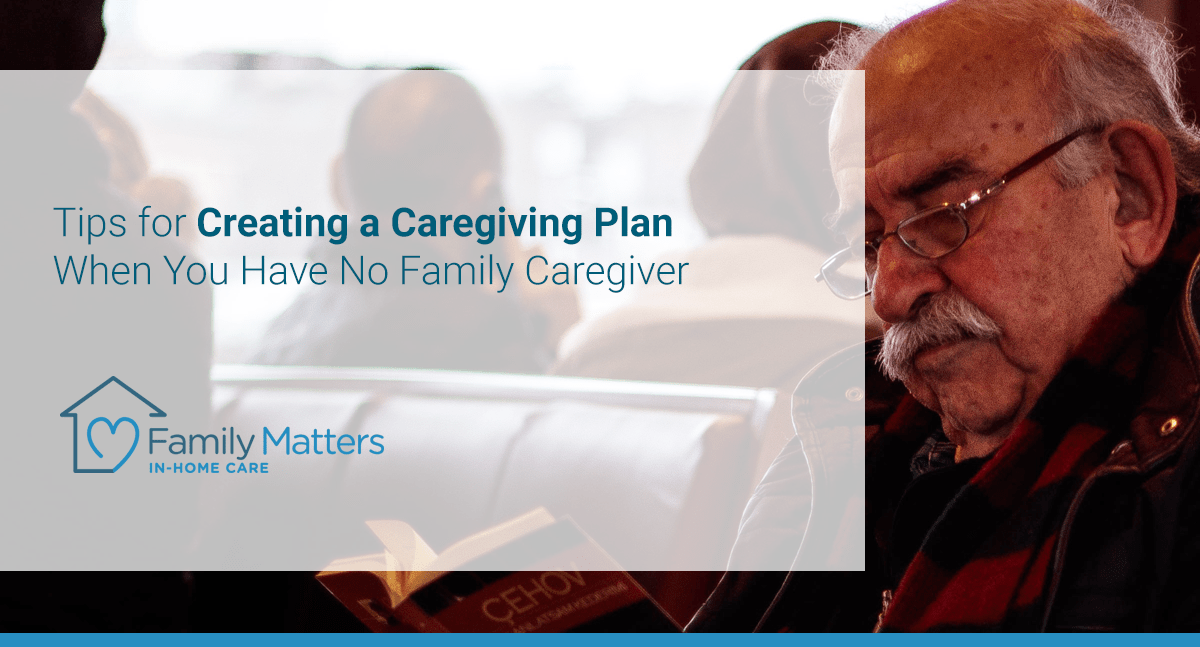
Tips for Creating a Caregiving Plan When You Have No Family Caregiver
The very idea of orphans—or stories, sights, sounds of them—tugs on the heartstrings. Interestingly, orphans bring to mind young children, perhaps tucked away and forgotten in some giant, foreboding stone and concrete building past the edge of town. However, 1 in 5 Americans over the age of 65 are at the risk of (or already are) “elder orphans”—those who are aging alone with no family nearby or available at all to help address caregiving needs. In fact, 23 percent of boomers are slated to eventually be without family caretakers, and that doesn’t include countless parents whose adult children are unavailable to assist them.
Unfortunately, even with already high numbers of elder orphans poised to soar, there remains a widely held assumption that everyone has a family caregiver waiting to come to the rescue. But that is simply not the case; even a traditional colonoscopy appointment isn’t allowed by a clinic unless you have someone to take you home. The sad reality is that not everyone has family available.
To assist in this life quandary, the American Geriatrics Society developed guidelines for public policy and the health care industry to assist elder orphans. Experts in the know have issued warnings of a potential crisis as America’s population ages, leaving fewer family caregivers to help. Consider the number of caregivers for people age 80 and up will likely fall to 4 to 1 by 2030 and 3 to 1 by 2050.
The silver lining is there is a lot you can do to assuage potential anguish and financial burden. Stay committed to the task and make sound decisions that will go a long way in supporting you when you need it most, whether that is tomorrow or when you turn 100.
That said, here are some helpful tips to plan ahead if you don’t have a family caregiver:
Consider where and how you wish to age
The time to evaluate your living situation and make a plan is while you’re still healthy. One of the most important steps is to identify the best place for you to live. That might be an area that is walkable, with mass transit or taxis available, or local senior transportation to and from common destinations including medical appointments or grocery stores.
Communal living is another option, including roommates or moving to a senior community or assisted living facility if finances are favorable for this choice.
Get your paperwork in order
When it comes to preparing or updating essential life care documents, be sure everything is accessible and your intentions are clear. It comes down to creating a scenario to minimize risk and deciding who is going to make crucial decisions for you if you become incapacitated. If you don’t have anyone in your personal life to fill that role, elder care resources in your region might be able to help.
Develop a social network
You may be in a situation where you cannot rely on friends for serious, long-term care but they can indeed help you in many ways. Friends are invaluable for bringing meals if you are ill or recovering, and they can do errands like picking up prescriptions or groceries, saving you a great deal of stress. It can be hard to make new friends later in life, and your old ones often don’t live nearby and most of them have their own health issues. Join a club, take a class, volunteer—do anything that can offer repeated exposure to new groups of people.
Create a care team for the future
If you are without family or close friends nearby that can lend a hand, you need to decide who to include in a circle of trust. Many elder orphans turn to clergy, care managers, counselors, or medical providers. Choose these people carefully and while it might seem like a lot of work it will save the day when it counts the most.
Be a creative thinker
Another option for elder orphans is adopting a family. In cases like this, a family agrees to care for someone in exchange for future bequeathed assets. Joining other elder orphans in a living situation with space for a live-in caregiver is also an alternative. As residents age they can count on the care they need.
If you or your family member is considering in-home care as part of a plan to age in place, contact Family Matters In-Home Care today for a free consultation. Our team is dedicated to supporting your family and helping older adults enjoy life in the comfort of their own home for as long as possible.
Some of the services offered by Family Matter In-Home Care include: Alzheimer’s & Dementia Care, Bed & Wheelchair Transfer Assistance, Companionship, Housekeeping & Meal Preparation, Personal Care, Recovery Care, and Transportation.
Serving the San Francisco Bay Area and Greater San Diego, Family Matter In-Home Care has offices throughout California including: Campbell, CA, Roseville, CA, San Marcos, CA, and San Mateo, CA.
